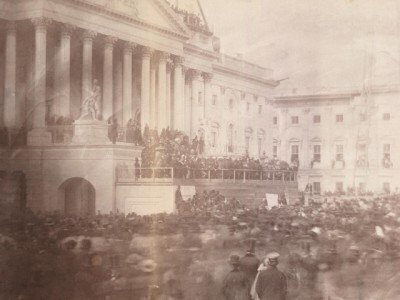It’s James Buchanan’s birthday today, so it’s time to revisit a recently debated topic: why many historians consider Abraham Lincoln’s predecessor to be the worst President in U.S. history.

The concept of ranking Presidents in an academic popularity poll gained attention in 1948 when historian Arthur M. Schlesinger decided to survey other historians about the past performance of Presidents.
Schlesinger polled 55 historians about five rating categories for an article in Life magazine. He noted that the hallmarks of what he considered “great Presidents” were that they were strong “party men”; they weren’t strong administrators; they had conflicts with the Supreme Court; and as strong leaders, they “arouse strong opposition.”
Schlesinger also noted that the historians he spoke with only ranked two Presidents as failures: Warren Harding and Ulysses S. Grant, and not Buchanan or Johnson. “As President, they were far beyond their depth,” Schlesinger said.
Since his 1948 study, the Civil Rights movement unfolded and the legacy of Civil War-era Presidents received a great deal of historical revision. For example, Andrew Johnson ranked 19th out of 29 Presidents in the 1948 Schlesinger poll, but by 1982 Johnson was solidly in the bottom four of all Presidents.
In contrast, as far as we can tell, Buchanan has never been ranked higher that the third-worst President since 1948, and Harding has only escaped the bottom three group once in a poll that involved professional historians—a 2009 survey conducted by C-SPAN where he was named the fourth-worst President.
Buchanan and Johnson are often considered two of the three worst Presidents in American history, along with Warren Harding—at least in 16 other polls that have attempted to get historians and others to rank Presidents using broader sets of criteria.
Siena College has conducted five of those surveys since 1982. Siena used 20 different criteria, with a possible high of 5 points for each category. The criteria include easily recognizable factors as foreign policy and communication ability, as well as more random factors such as luck and the opinions of other experts
The Siena poll in 2010 ranked Andrew Johnson as the worst President, followed by Buchanan and Warren Harding.
The most-recent poll to get public attention this February by C-SPAN. The bottom three Presidents were Buchanan, followed by and Franklin Pierce. It is clear that since a 1999 C-SPAN poll where he was first ranked as the worst President, Buchanan has dominated the bottom spot in these surveys. So why do historians and political scientists have such as harsh view of Buchanan? Perhaps the answer can be found in some thoughts from Michael J. Birkner, a Gettysburg College historian who thinks Buchanan’s legacy should be evaluated again.
In an op-ed for Lancaster (Pa.) Online, Birkner describes several acts by Buchanan as “indefensible,” including his connection to the Dred Scott decision by the Supreme Court in 1857, and his claims “that a decision that made slavery national would somehow ‘solve’ the sectional crisis.”
In fact, Buchanan seemingly endorsed the Dred Scott decision in his inaugural address two days before it was announced by the Supreme Court.
“The whole Territorial question being thus settled upon the principle of popular sovereignty—a principle as ancient as free government itself—everything of a practical nature has been decided. No other question remains for adjustment, because all agree that under the Constitution slavery in the States is beyond the reach of any human power except that of the respective States themselves wherein it exists,” Buchanan said in his speech.
Birkner also admits that Buchanan’s use of patronage as a political tool and his controversial policies in Kansas were indefensible. He also acknowledges the findings of historians such as Samuel Eliot Morison, Henry Steele Commager and James McPherson that Buchanan was among the worst Presidents.
Birkner believes Buchanan should get some credit for strengthening relations with Great Britain and giving Lincoln a chance to pursue an agreement with the Southern states before the Civil War began, but he is also realistic about Buchanan’s reputation.
“James Buchanan will never be ranked among the nation’s more popular or successful presidents. Even his warmest local adherents will concede that he will always inhabit the basement in presidential rankings, albeit joined there by other presidents who did not live up to their billing or potential,” he said. Also, in 2013, Birkner told the BBC he considered Andrew Johnson to be the worst President ever.
A more frank assessment of Buchanan’s legacy came from historian Paul Finkelman at Albany Law School, who wrote about Buchanan in a critical essay as part of the “American Presidents” series. (Finkelman has also been a scholar-in-residence at the National Constitution Center.)
“He had developed no policy for keeping the nation together, made no plans to uphold the Constitution, and made no preparations for the coming war,” Finkelman said.
Also in 1972, Commager told a Senate committee about how weak Presidents, such as Buchanan, posed problems.
In comparison with strong Presidents, he said, “weak Presidents, men like Fillmore, Buchanan and Harding … bring democracy into disrepute and expose the Constitution to grave perils,” he said.
In the end, after he retired to Pennsylvania, Buchanan thought that history would have a different opinion of his legacy. Just before his death in 1868, he said, “History will vindicate my memory from every unjust aspersion.”







